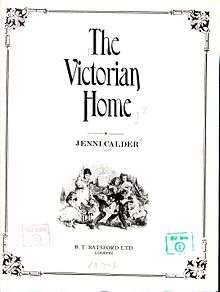Jenni Calder
Jenni Calder (née Daiches) (born 1941) is a Scottish literary historian, and arts establishment figure. She was formerly married to Angus Calder, and is the daughter of David Daiches.

On the question of Scottish independence; of 27 Scottish authors whose opinion was sought, Calder was one of only two offering a definite No.[1]
Some works
- Chronicles of Conscience. A Study of George Orwell and Arthur Koestler. Secker & Warburg, 1968
- There Must Be a Lone Ranger: The myth and reality of the American Wild West. Hamish Hamilton, 1974
- Huxley Brave New World and Orwell Nineteen Eighty Four. Edward Arnold, 1976
- Women and Marriage in Victorian Fiction. Thames And Hudson, 1976
- The Victorian Home. Book Club Associates, 1977
- Heroes: From Byron to Guevara. Hamish Hamilton, 1977
- RLS: A Life Study of Robert Louis Stevenson. Hamish Hamilton, 1980
- Stevenson and Victorian Scotland. Edinburgh University Press, 1984
- Animal Farm and Nineteen Eighty Four. Open University, 1988
- The Wealth of a Nation. Publications Office, Edinburgh, 1989
- Scotland in Trust: The National Trust for Scotland, 1990
- The Story of the Scottish Soldier, 1600-1914. National Museums of Scotland, 1992
- Enterprising Scot: Scottish Adventure and Achievemt. National Museums of Scotland, 1995
- The Nine Lives of Naomi Mitchison. Virago, 1997
- Scots in the USA. Luath Press, 2006
- Not Nebuchadnezzar. Luath Press
Notes
- "Of the 27, I counted 15 who would give a definite Yes to independence. Only two of the others – Jenni Calder and myself – give a definite No." "Never knowingly understated". Ken MacLeod, The Early Days of A Better Nation. 19 December 2012. Retrieved 12 July 2014.
gollark: Sometimes I really worry about my code.
gollark: I can. I just won't.
gollark: I already control all political systems, silly bees.
gollark: Anyway, I forgot how potential energy should work in this, so I guess I'll just rederive it.
gollark: I don't care either way, I procedurally generate legal systems in which all my actions are and always were legal whenever needed.
This article is issued from Wikipedia. The text is licensed under Creative Commons - Attribution - Sharealike. Additional terms may apply for the media files.